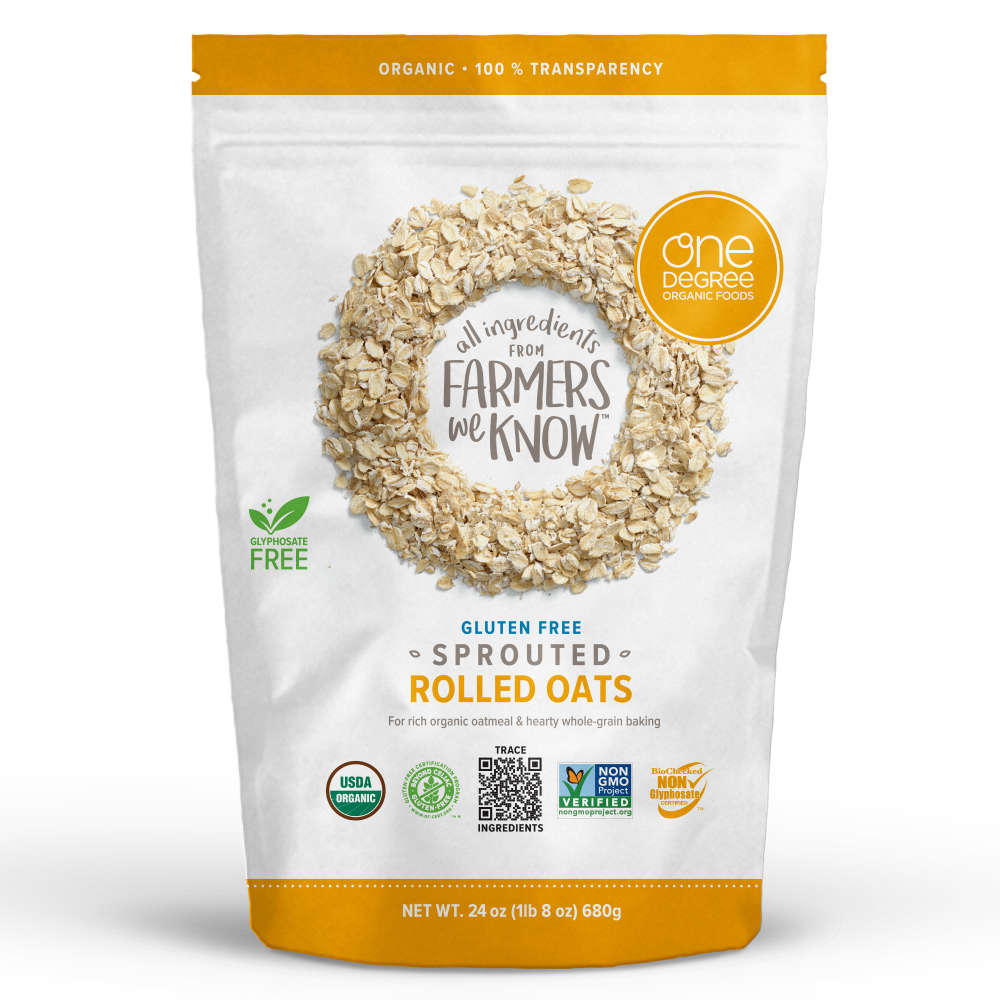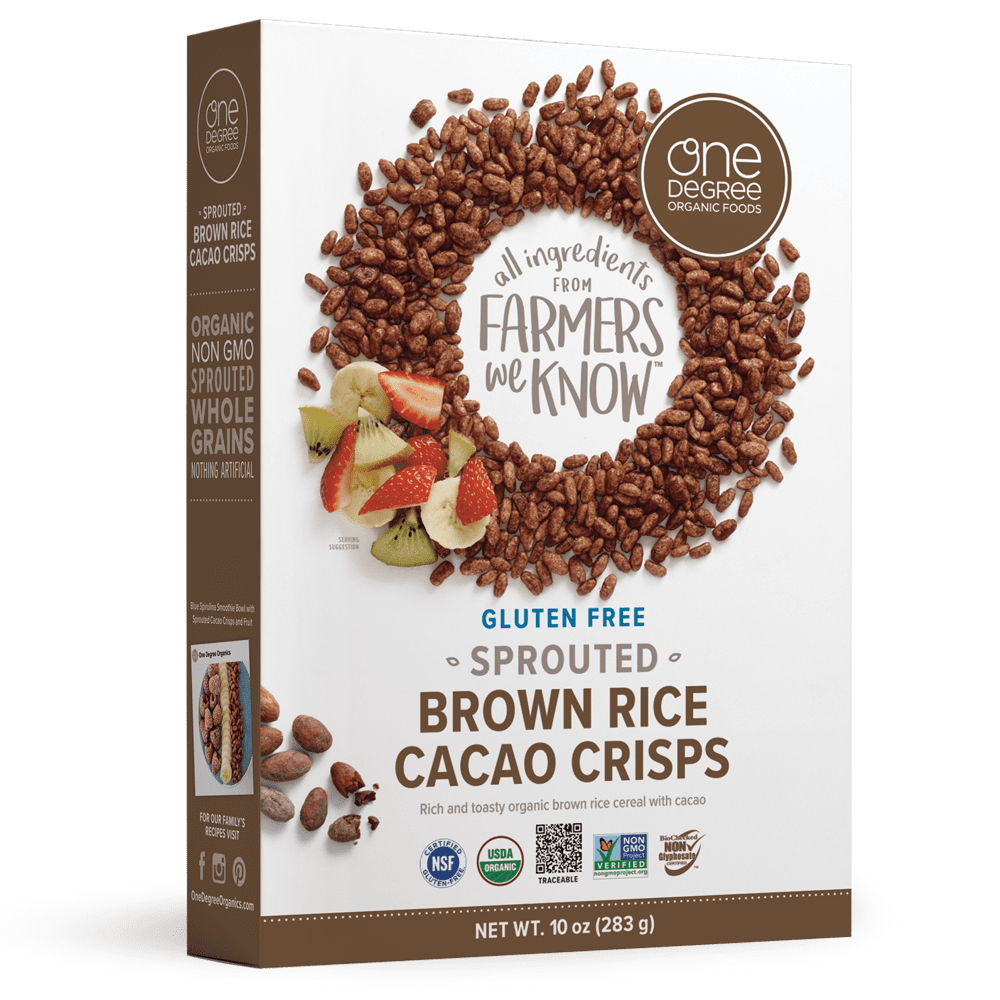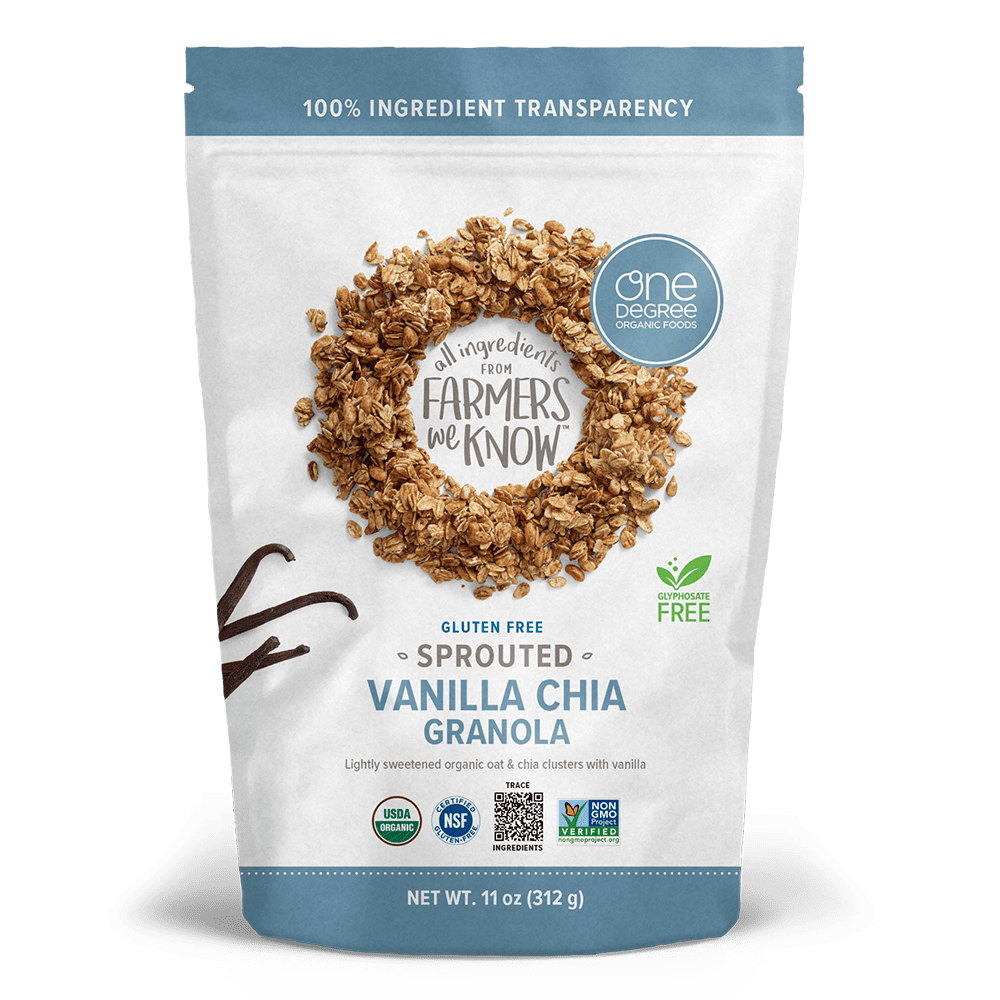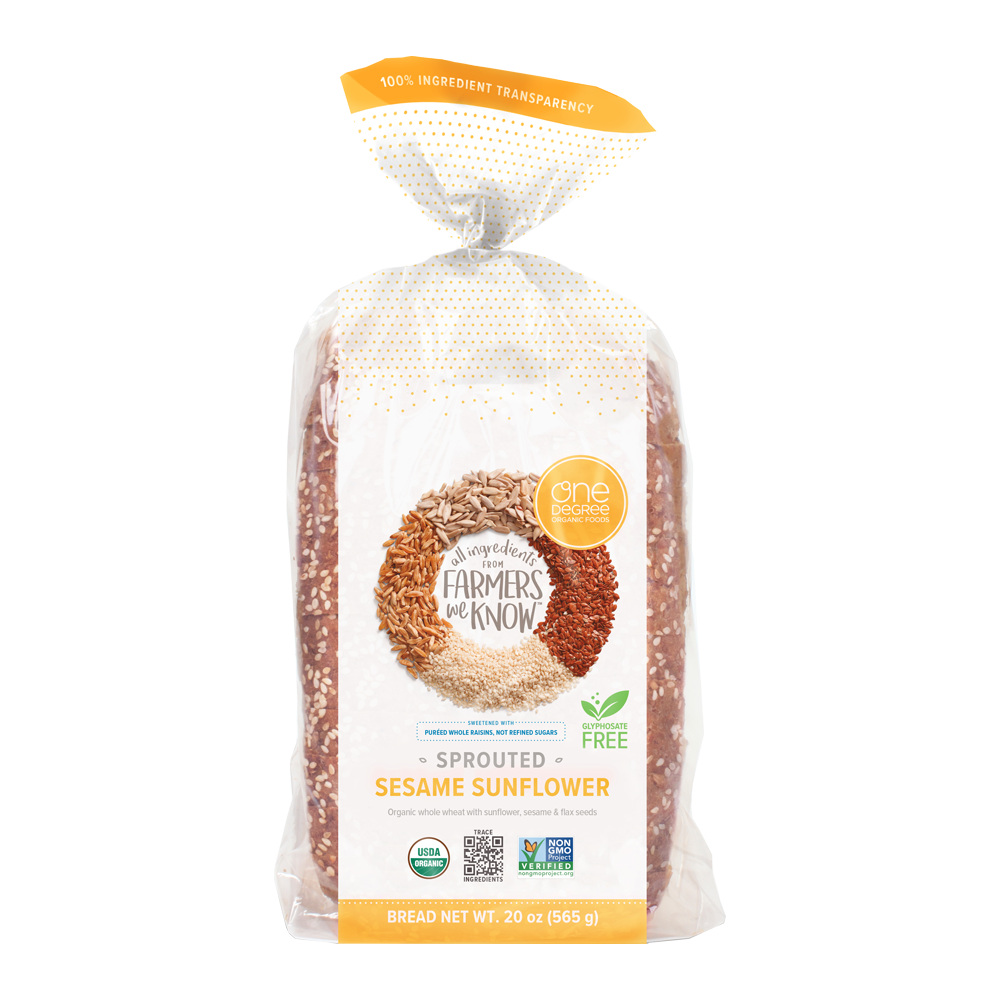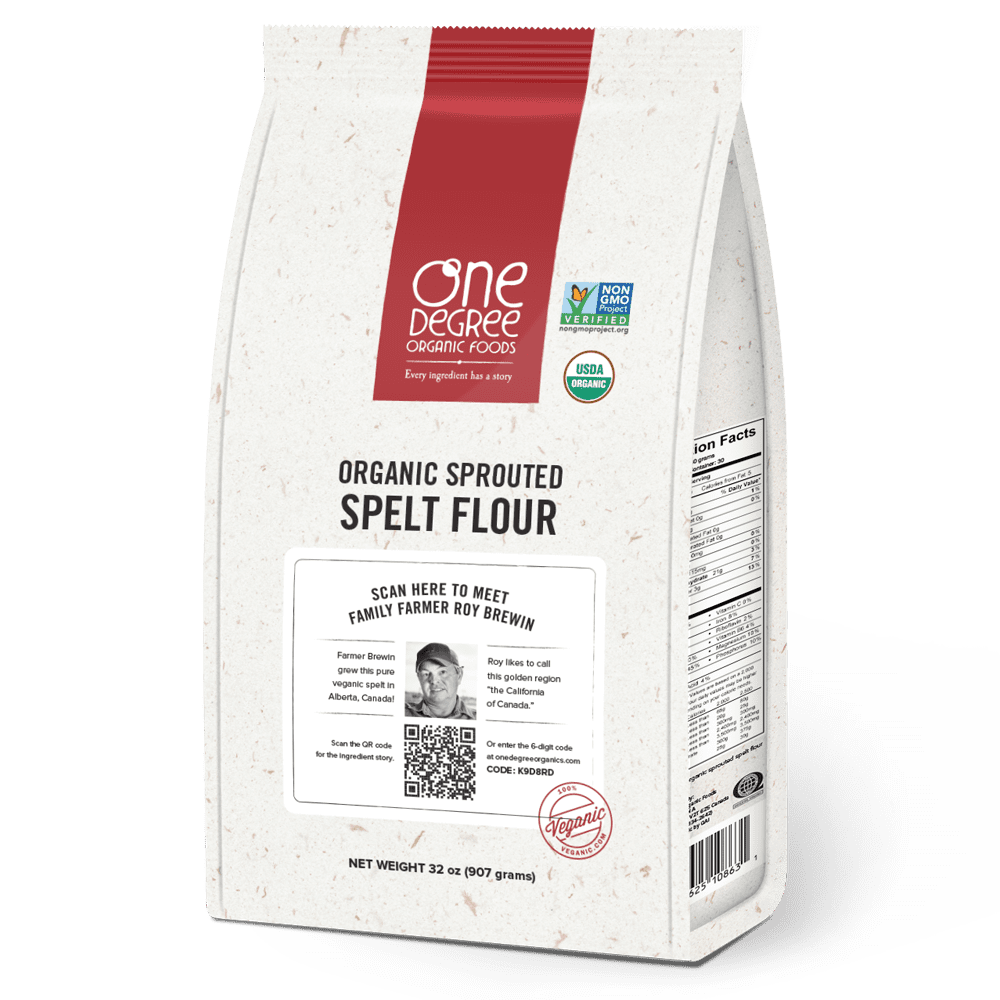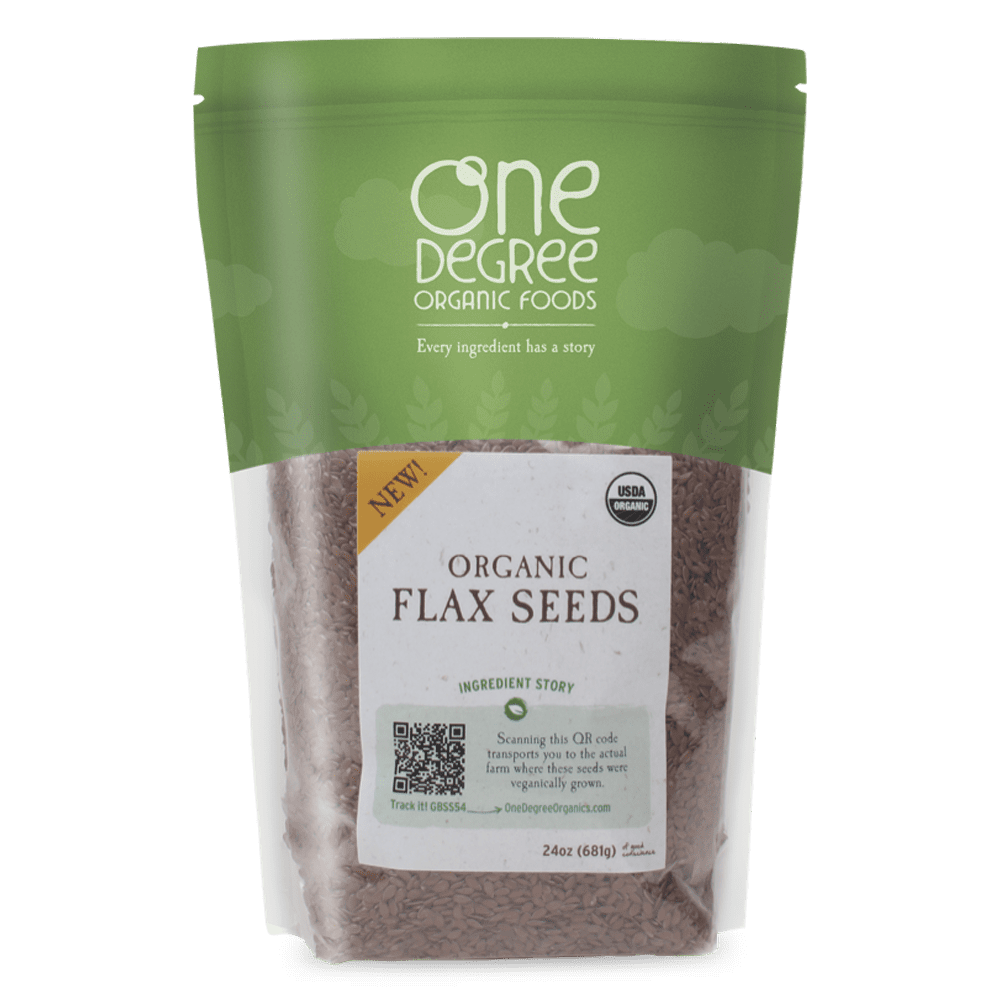Sprouted Flour FAQs: Questions & Answers About Sprouted Flour
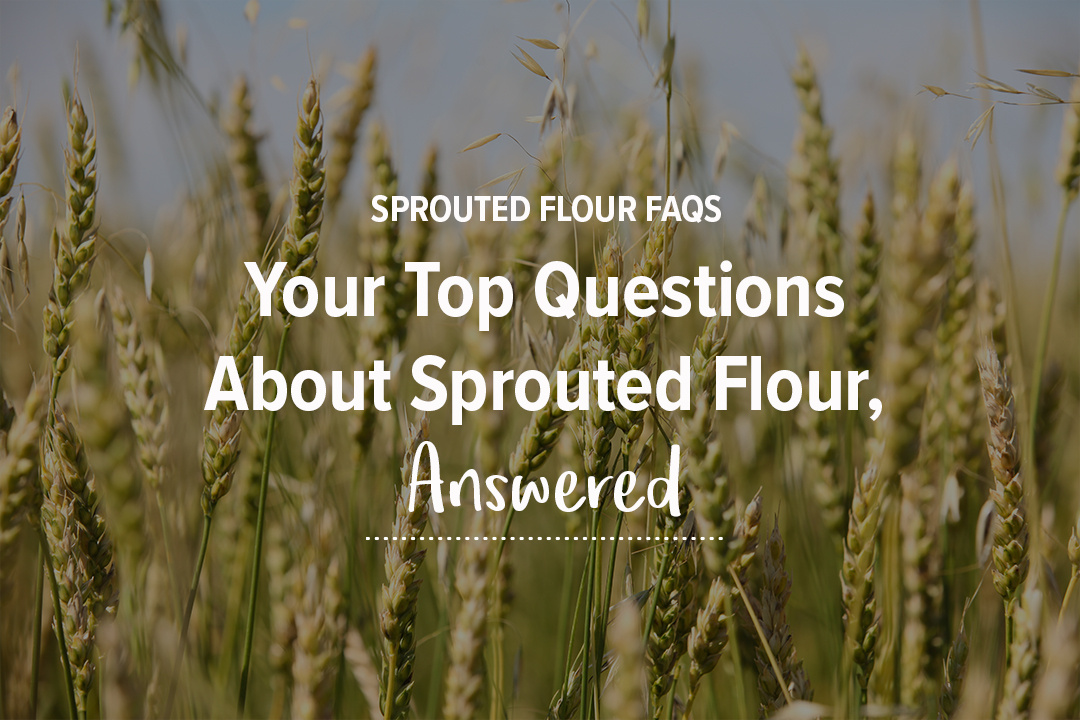
Your Top Questions About Sprouted Whole Wheat Flour, Sprouted Spelt Flour, Sprouted Khorasan Flour, and Sprouted Brown Rice Flour—and the Answers to Go With Them
From first-time triers to long-time sprouted flour fans, One Degree Organics customers share one trait in common—they are full of smart and curious questions, and they are not shy to ask!
“What makes sprouted flour better?” and “Can I swap sprouted spelt flour for regular whole wheat flour?” are just the beginning. That’s why we’ve compiled our most asked questions into this Sprouted Flour FAQs page. So you can get all the answers you need to know about why, how, and where to use which sprouted flour to make your best baking recipes better—and have them turn out every time!
In this sprouted flour FAQs article:
- What’s the difference between:
- How to use sprouted flour:
- How to store sprouted flour:
- Processing sprouted flour:
- Raw sprouted flour:
- Why you can trust One Degree Organics sprouted flours:
Sprouted flour vs regular flour
Q: What is sprouted flour?
A: Sprouted flour is flour made from whole grains that have been carefully sprouted to unlock all the nutrition and goodness stored inside.
You can learn all about sprouted flour—from nutritional benefits to why sprouted flour makes better bread—in our article, The Benefits of Sprouted Flour: How To Use Sprouted Flour—And Why! here.
Q: What is the difference between sprouted flour and regular flour (unsprouted flour)?
A: To answer this question fairly, we can only compare sprouted whole grain flour to regular whole grain flour.
Why? Because refined, enriched white, or all-purpose flour is completely different from whole grain flour—sprouted or not—both in their respective nutrition facts and in how they behave in recipes.
Both regular whole grain flour and sprouted whole grain flour include 100% of the bran and germ of the grain, no matter what type of grain they are made from.
The basic difference? Sprouted flour is made from whole grain kernels that have been sprouted before milling, and regular flour is made from hard, unsprouted whole grain kernels. Sprouting softens hard grains like wheat, spelt, khorasan, and brown rice. That makes them easier to grind into a fine flour.
To learn more about why you should use sprouted flour in your favorite recipes—including the science of why sprouted flour bakes better bread—dive into our article, The Benefits of Sprouted Flour: How To Use Sprouted Flour—And Why! here.
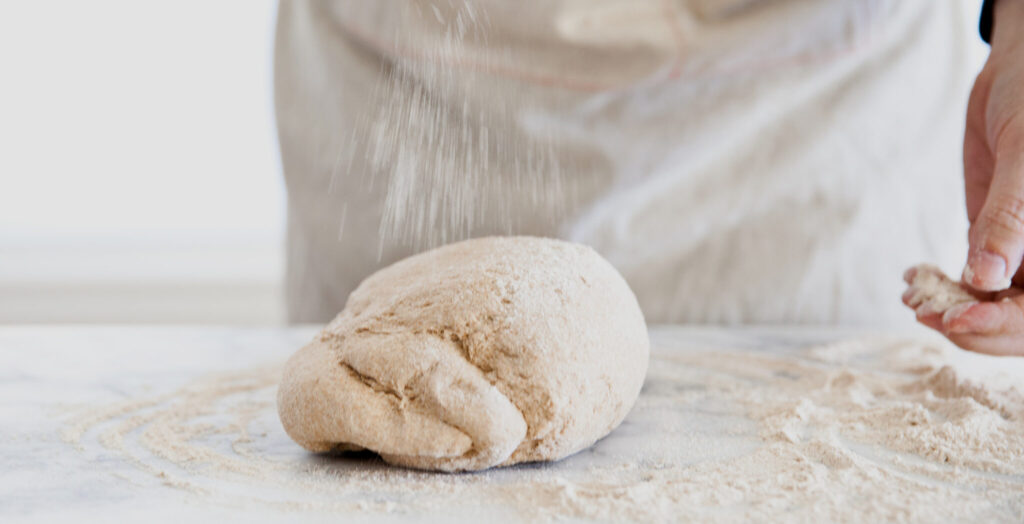
Q: Is sprouted flour better for you? What are the benefits of sprouted flour?
A: Sprouted flours are beloved for their soft, silky texture, and the extra touch of tenderness they bring to recipes. But those are far from the only perks! Using sprouted flour improves baking performance, makes soft but strong doughs with rich, golden crusts, and unlocks the full nutritional potential of whole grains.
Sprouted flour nutrition
Sprouting activates enzymes that break down antinutrients—like phytates, trypsin inhibitors, and tannins—in whole grains, increasing the bioavailability of vitamins and minerals.
With less phytic acid, sprouted flour (and the sprouted whole grains used to make it) gives you more zinc, iron, magnesium, phosphorous, and B vitamins[1] your body can absorb. At the same time, sprouting can boost the nutrition content in sprouted whole grains—and the nutritional value of sprouted flour made from them!—including antioxidant vitamins C and E, beta carotene, and polyphenols[2],[3].
And the same process makes sprouted whole grains and sprouted flour easier to digest, too!
(Everything that applies to sprouted whole grains also applies to sprouted whole grain flour. So, yes! Sprouted flour is better for you!)
back to Sprouted Flour FAQs top
How to Use Sprouted Flour:
Sprouted flour vs. regular flour in recipes
Q: When should I use sprouted flour vs regular flour in a recipe?
A: You can use sprouted flour the same way you use regular whole grain flour of the same type! That means you can use One Degree Organics sprouted whole grain flours in place of regular flour made from the same kind of whole grain in all your favorite recipes.
Sprouted whole wheat flour vs. regular whole wheat flour
Sprouted whole wheat flour can be used as a direct, one-to-one swap in any recipe that calls for regular whole wheat flour.
As a family of passionate home bakers with hands-on experience, we consider One Degree Organics Sprouted Whole Wheat Flour and Whole Wheat Flour interchangeable in any recipe made with conventional whole wheat flour.
If you are new to sprouted flour and have only baked with regular all-purpose and regular whole wheat flour before, One Degree Organics Sprouted Whole Wheat Flour is the best swap to start you off!
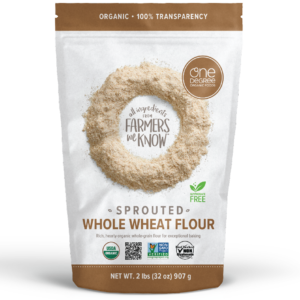
Sprouted brown rice flour vs. regular brown rice flour
You can also swap sprouted brown rice flour in any recipe that calls for regular brown rice flour.
Note:
Because sprouted brown rice flour is gluten-free, it cannot be swapped for a gluten-containing flour without adding other ingredients.
You also can’t use sprouted brown rice flour as a one-for-one swap for an all-purpose gluten-free flour blend designed to be a cup-for-cup substitute for flours with gluten. Gluten-free all-purpose flour blends include ingredients like xanthan gum or fiber to help them bind and stretch like gluten.
One Degree Organics Sprouted Brown Rice Flour is a single ingredient gluten-free flour that is excellent in recipes like pancakes, brownies, cookies, or cupcakes that do not depend on a flour with gluten-like properties to hold it together.
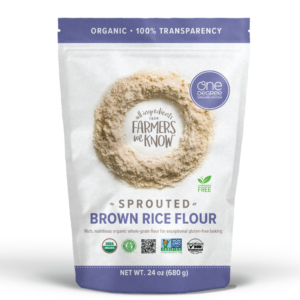
Sprouted spelt flour vs. regular spelt flour
Got a recipe that calls for regular spelt flour? Sprouted spelt flour is a one-to-one swap sure to serve up delicious results!
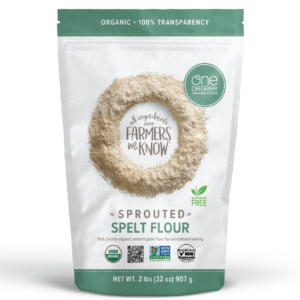
Sprouted khorasan flour vs. regular khorasan flour vs. Kamut® flour
Kamut® is a trademarked name for khorasan wheat—the same grain One Degree Organics Sprouted Khorasan Flour is made from. Any recipe that calls for Kamut® flour or regular khorasan flour will work equally well with sprouted khorasan flour.
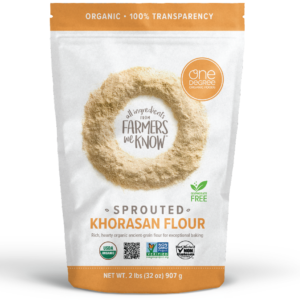
back to Sprouted Flour FAQs top
Sprouted spelt flour vs. whole wheat flour in recipes
Q: Can I swap sprouted spelt flour for regular whole wheat flour?
A: In our family’s generational experience as home bakers, we have found sprouted spelt flour is 100% swappable for recipes that call for regular whole wheat flour. From bread to muffins, anywhere you would use regular whole wheat or sprouted whole wheat flour is fair game for a cup-for-cup swap with sprouted spelt flour.
Advanced bakers who use bakers’ percentages or account for precise water saturation / dough hydration may find they need to experiment a little with sprouted spelt—but no more than you would working with a different brand or bag of any other flour you buy (which can vary from batch to batch anyway).
Otherwise, the differences between baking with sprouted spelt vs. regular whole wheat flour are subtle. Some say sprouted spelt flour is a little lighter than whole wheat. Others say One Degree Organics Sprouted Spelt Flour adds a delicate nutty taste, or a little tenderness. And there are some family recipes—like Grandpa Smith’s Spelt Bread and Buns or this versatile spelt pie and tart crust that wouldn’t taste the same made any other way.
Sprouted khorasan flour vs. whole wheat flour in recipes
Q: Can I swap sprouted khorasan flour for regular whole wheat flour?
A: A non-hybridized ancient grain, khorasan wheat kernels are larger and have a little less gluten than modern wheat. Sprouted khorasan flour adds a lovely golden color and a unique, almost buttery flavor to baking.
You can use sprouted khorasan as a one-to-one swap for whole wheat flour in a recipe where the whole wheat flour is paired with all-purpose flour. Cookies, muffins, cakes or breads with up to 50/50 whole wheat to all-purpose are good candidates for a sprouted khorasan flour swap.
But in true whole grain recipes—like a 100% whole wheat loaf of bread—using 100% sprouted khorasan flour may cause things to fall a little flat. Because it has less gluten (and a slightly coarser texture compared to other whole grain flours) breads made only with sprouted khorasan flour won’t necessarily have good lift or structure and tend to break easily.
Grandma Smith—cherished in our family as our best home baker when it came to bread—loved sprouted khorasan flour. She added small amounts of gluten-flour (vital wheat gluten) to her sprouted khorasan bread recipes to give it a needed boost without having to use an all-purpose flour or blend it with whole wheat flour.
We recommend pairing sprouted khorasan flour with lighter flours, using recipes designed for this unique ingredient, or being prepared to experiment your way to your own secret recipe that lets its best features shine through.
back to Sprouted Flour FAQs top
Sprouted flour shelf life and sprouted flour storage instructions:
Q: How should I store sprouted flour?
A: As with most whole grain pantry staples, the best way to store sprouted flour is in an air-tight container. You can store One Degree Organics Sprouted Whole Wheat Flour, Sprouted Spelt Flour, Sprouted Khorasan Flour, or Sprouted Brown Rice Flour in their resealable bag. Or you can transfer them to any glass, metal, ceramic, or plastic container that has a tight-fitting lid and fits in your pantry.
Best Before Date Tip for Container Storage of Sprouted Flour:
If you prefer to store your flour in an air-tight container rather than in the resealable bag, cut out the small section of the bag with Best Before date stamped on it before you recycle the packaging. Then tape it on your container (or toss it in with the flour!) so you don’t have to remember how long it has been in your pantry.
Q: Should I store sprouted flour in the fridge?
A: From the date of manufacture, One Degree Organics sprouted flours are shelf stable at room temperature for one year. You do not need to store our sprouted flours in the fridge to keep them fresh!
But storing sprouted flour in your fridge or freezer won’t hurt it! So, if you live in a climate that is hot and humid, go ahead and store your sprouted flour in an air-tight container in your fridge or freezer if you like (and have room!).
Q: How long does sprouted flour last once the bag is opened?
A: From the date of manufacture, One Degree Organics sprouted flours have a shelf-life of 12 months. Stored in a properly sealed bag or air-tight container, our sprouted flours are guaranteed good until the Best Before date stamped on the bag.
How long sprouted flour lasts once you open the bag depends both on how it was stored after the bag was opened, and how close to the Best Before date the bag was opened.
Climate and storage conditions can impact how long sprouted flour stays fresh. If you live somewhere hot and humid, and your storage container has a loose-fitting lid or you left the bag unsealed after the bag was opened, sprouted flour may not stay fresh as long.
As with most foods, the Best Before date is not an expiry date. It is the date to which One Degree Organics can guarantee freshness. Stored correctly in an air-tight container, your sprouted flour may be usable for many weeks or months beyond the Best Before date.
Q: Does sprouted flour go bad?
A: Yes. All types of flour—sprouted, unsprouted, wheat, spelt, or from any other grain—will eventually spoil because of age, how they were stored, or both.
How can you tell if sprouted flour has gone bad?
Smell it! No matter which grain it is made from, fresh flour either has no odor, or has a pleasant neutral or faint nutty aroma. Whether it is sprouted or not, any kind of flour that has spoiled will have a rancid smell. Depending on the type of flour (and how spoiled it is!), some describe the smell of flour that has gone bad as musty, stale, or sour, while others say it smells like playdough or papier mâché paste that’s been left to sit too long.
Other sure signs the flour in that un-labeled jar or half-empty bag at the back of the pantry—sprouted or otherwise—is better off in the compost bin than in your baking?
-
- Color changes (do not use technicolor flour—whole grain flours should be some shade of light brown, beige, or tan, not green!)
- Clumps (flour should be smooth and powdery; lumps and clumps mean there is moisture in the flour)
- Bugs (pantry moths, weevils, or any other creatures do not belong in flour!)
back to Sprouted Flour FAQs top
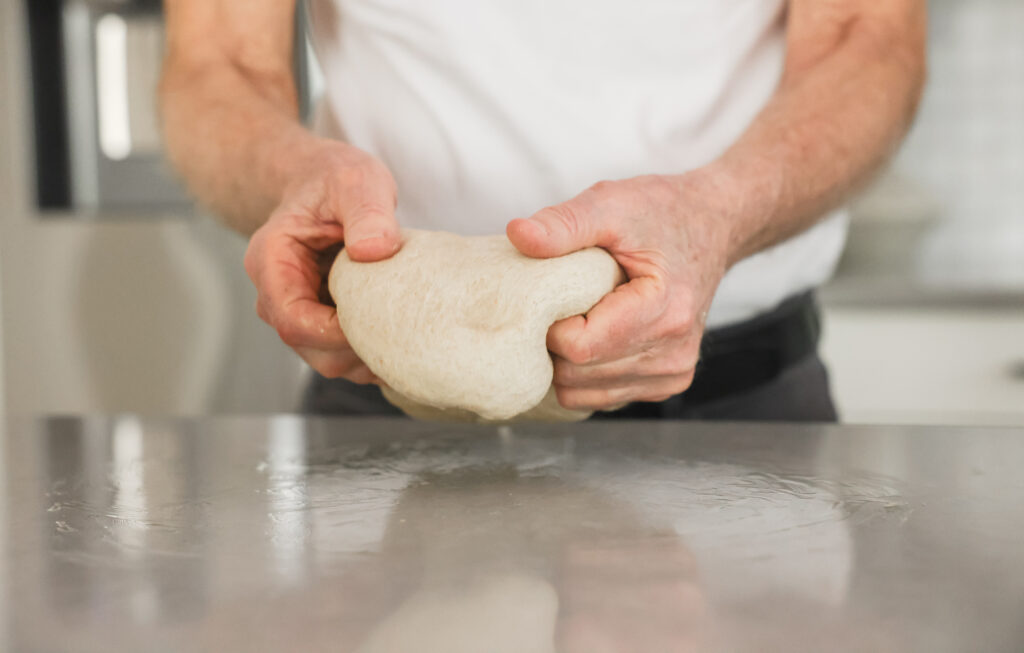
How is sprouted flour made and processed?
Q: How are One Degree Organics sprouted flours made?
A: Sprouted or unsprouted, whole grain flours all use some kind of mechanical process to break up the kernels and grind them into flour you can bake with. One Degree Organics sprouted flours all begin by giving our organic whole grains a cleansing shower followed by a long, relaxing bath in a sprouting tank.
Once the grain begins to sprout, we gently oven dry them. Then our team of milling experts grinds our sprouted grains with a hammer mill or stone mill until they reach the smooth, silky texture that makes our sprouted flours extra special.
To learn more about how our sprouted flour is made, scroll to the How is Sprouted Flour Made? section of our article “The Benefits of Sprouted Flour: How to Use Sprouted Flour—And Why!” here.
Q: Are One Degree Organics sprouted flours whole grain?
A: Yes! All One Degree Organics sprouted flours—sprouted spelt flour, sprouted whole wheat flour, sprouted khorasan flour, and sprouted brown rice flour—are whole grain flours. They contain all parts of the whole grain, including the nutrient dense, fiber-rich bran and protein-rich germ.
back to Sprouted Flour FAQs top
Raw flour: Is sprouted flour safe to eat uncooked?
Q: One Degree Organics sprouted flour packaging says, “Product not intended for raw consumption.” Why?
A: Most flour you buy in the baking aisle—whether sprouted organic or regular conventional, whole grain or all-purpose, bleached or unbleached—is raw.
Like all foods grown outdoors where wildlife roam and birds fly free, grains can be exposed to harmful bacteria in the field—even when they’re grown with the utmost care using the plant-based organic farming methods One Degree Organics farmer partners practice.
Standard flour processing steps like grinding and milling do not kill bacteria like Escherichia coli (E. coli) and Salmonella that can cause food poisoning.
And although the grains we use to make our sprouted flours are carefully washed then gently oven dried after we sprout them, the temperature we use (below 108 degrees F (42 degrees C)) to deactivate enzymes and stop the sprouting process is not high enough to make our flours safe to eat raw.
Further, although we uphold all standard microbiological testing protocols, sample testing cannot guarantee an entire production lot of flour is pathogen free. And this is as true in One Degree Organics’ sprouted flour processing facilities as it is for any manufacturer of flour in North America.
Both US FDA and Health Canada food safety guidelines recommend against eating raw flour[4],[5] for good reason—dozens of flour-related cases of foodborne illness are recorded every year.
Because many people grew up licking the beaters and sneaking bits of raw cookie dough without knowing the risk, we include the statement “Product not intended for raw consumption” on our sprouted flour packaging as a reminder that we care about you and your family’s health.
(And your safety is worth waiting until your cookies and cakes are baked to sample your wares!)
back to Sprouted Flour FAQs top
Why you can trust One Degree Organics sprouted flours:
Unbleached and unbromated sprouted flour, glyphosate-free sprouted flour, which sprouted flours are gluten-free, peanut-free, or tree nut-free, and our certifications
Q: Are One Degree Organics sprouted flours fortified or enriched?
A: No. Unlike refined white flours—which lose a lot of nutrition when the germ and bran are removed during processing—neither the United States or Canada require whole grain flours to be fortified or enriched with B vitamins, iron, or folic acid.
You will only find one ingredient on each of our single grain sprouted flours. And every gram of nutrition you get from One Degree Organic sprouted flours comes directly from the sprouted whole grain itself.
Q: Are One Degree Organics sprouted flours bleached?
A: No. From delicate tan to the faintest pastel tints of browns and golds, our sprouted flours get their subtle off-white color directly from the grains they are made from. Nothing is added or taken away during processing, and no chemicals are used to make them lighter, whiter, or otherwise alter their natural beauty.
Q: Are One Degree Organics sprouted flours bromated?
A: No. In the United States, some manufacturers treat or enrich their flour with potassium bromate to improve dough elasticity and produce a higher rise in products baked with them.
One Degree Organics sprouted flours are not bromated and will never be.
And not just because potassium bromate—shown to be genotoxic and identified as a human health hazard—is banned as a food additive in Canada, the EU, the UK, and many other countries.
Our commitment to total food transparency and using only clean, organic ingredients is incompatible with additives like potassium bromate—whether they are legal or not.
But when it comes to sprouted flour, there is another compelling reason to add on top of never compromising our belief in organic, plant-based, whole food ingredients—sprouted flours already do all the things bromated flours are supposed to do better, no additives required.
Studies of bread made from sprouted whole wheat flour—or even with a blend of sprouted and unsprouted flour—show that sprouted flour increases dough strength and loaf height, improves loaf volume, and produces bread with a softer crumb[6],[7].
Mother Nature’s perfection is tough to beat.
Are sprouted flours glyphosate-free?
Q: Are One Degree Organics sprouted flours tested for glyphosate?
A: Glyphosate is an herbicide used on conventional grain crops from wheat to oats. Because One Degree Organics sprouted flours are certified organic, glyphosate cannot be used when the grains we use to make them are grown or harvested. But glyphosate can drift from other farms and contaminate groundwater. That’s why we go above and beyond to ensure our sprouted flours are glyphosate free.
All One Degree Organics sprouted flours are tested for glyphosate and certified glyphosate free.
Q: Who certifies One Degree Organics sprouted flours glyphosate-free?
A: To ensure the sprouted whole wheat flour, sprouted spelt flour, sprouted khorasan flour, and sprouted brown rice flour we make with them are free from glyphosate, we have our whole grains third-party tested and BioChecked Non-Glyphosate Certified. You can find the BioChecked Non-Glyphosate Certified logo next to the Non-GMO Project Verified stamp on the front of all our new flour packaging, along with our own glyphosate-free icon.

Are your sprouted flours tested for allergens?
Q: Are One Degree Organics sprouted flours peanut- or tree nut-free?
A: Yes! All our sprouted flours are proudly made in a peanut-free facility, so you can be confident One Degree Organics Sprouted Whole Wheat Flour, Sprouted Spelt Flour, Sprouted Khorasan Flour, and Sprouted Brown Rice Flour are peanut-free!
In addition to being peanut-free, One Degree Organics Sprouted Brown Rice Flour is also made in a tree nut-free facility. Our Sprouted Brown Rice Flour is the only sprouted flour in our collection that is both peanut- and tree nut-free.
(One Degree Organics Sprouted Whole Wheat Flour, Sprouted Spelt Flour, and Sprouted Khorasan Flour are peanut-free, but made in a facility that also handles tree nuts).
For full allergen details for our other products, including our other flours, please read the answer to “Are One Degree Organics products peanut- and/or tree nut-free?” on our general FAQ page.
Are any of your sprouted flours gluten-free?
Q: Which One Degree Organics sprouted flours are gluten-free?
A: Although we have many gluten-free products in other categories, One Degree Organics Sprouted Brown Rice Flour is the only certified gluten-free flour in our collection.
Q: How do you make sure One Degree Organics Sprouted Brown Rice Flour is gluten-free?
A: All rice is naturally gluten-free. Unlike oats which call for extra care including geographic and mechanical separation before processing, the organic rice we use to make our sprouted brown rice flour is simply sprouted and processed on dedicated gluten-free production lines. Then we test the finished flour using the gold standard ELISA test to make sure it meets the US and Canadian standard of less than 20 ppm of gluten required by all major gluten-free certification programs.
Q: Who certifies One Degree Organics Sprouted Brown Rice Flour gluten-free? What gluten-free certifications do you use for your sprouted brown rice flour?
A: One Degree Organics Sprouted Brown Rice Flour is certified through Gluten-free Certification Program, Beyond Celiac, and the Canadian Celiac Association, depending on the country of sale. These organizations rigorously test and certify our gluten-free products—including our sprouted brown rice flour—using sensitive gluten detection methods.
One Degree Organics Sprouted Brown Rice Flour is a safe and delicious choice for those with celiac disease or gluten sensitivities.
back to Sprouted Flour FAQs top
References
[1] Lemmens, E., Moroni, A., Pagand, J., Heiraut, P., Ritala, A., Karlen, Y., Le, K.A., Van den Broeck, H., Brouns, F., De Brier, N., Delcour, J., Impact of Cereal Seed Sprouting on Its Nutritional and Technological Properties: A Critical Review. Comprehensive Reviews in Food Science and Food Safety, 12 Dec. 2018. Available from: https://onlinelibrary.wiley.com/doi/full/10.1111/1541-4337.12414, accessed December 4, 2019.
[2] Benincasa P., Falcinelli B., Lutts S., Stagnari F., Galieni A.. Sprouted Grains: A Comprehensive Review. Nutrients. 2019; 11(2):421. Available from: https://www.mdpi.com/2072-6643/11/2/421/htm, accessed December 4, 2019.
[3] Žilić, S., Basić, Z., Šukalović, V., Maksimović, V., Jankovic, M., Filipović, M., Can The Sprouting Process Applied To Wheat Improve The Contents Of Vitamins And Phenolic Compounds And Antioxidant Capacity Of The Flour? International Journal of Food Science & Technology. 49. 1040-1047 10.1111/ijfs.12397, 2014. Available from: https://www.researchgate.net/publication/260802955_Can_the_sprouting_process_applied_to_wheat_improve_the_contents_of_vitamins_and_phenolic_compounds_and_antioxidant_capacity_of_the_flour, accessed June 17, 2020.
[4] United States Food & Drug Administration, Handling Flour Safely: What You Need to Know. FDA.gov, May 5, 2022. Available from: https://www.fda.gov/food/buy-store-serve-safe-food/handling-flour-safely-what-you-need-know, accessed March 14, 2023.
[5] Health Canada, Safe Handling of Flour. Canada.ca/en/health-canada, 2021-01-04. Available from: https://www.canada.ca/en/health-canada/services/general-food-safety-tips/safe-handling-flour.html, accessed March 14, 2023.
[6] Cardone, G., D’Incecco, P., Pagani, M. A., Marti, A., Sprouting improves the bread-making performance of whole wheat flour (Triticum aestivum L.). Journal of the Science of Food and Agriculture, Volume 100,6: 2453-2459, February 6, 2020. Available from: https://air.unimi.it/retrieve/handle/2434/727156/1450426/Cardone%20et%20al.%202020_Sprouting%20improves%20the%20bread-making%20performance%20of%20whole%20wheat%20flour_pre-print.pdf, accessed September 27, 2021.
[7] Poudel, R., Finnie, S., & Rose, D. J., Effects of wheat kernel germination time and drying temperature on compositional and end-use properties of the resulting whole wheat flour. Journal of Cereal Science, Volume 86, March 2019 p 33 – 40. Available from https://www.sciencedirect.com/science/article/abs/pii/S0733521018306994?via%3Dihub, accessed September 27, 2021.
